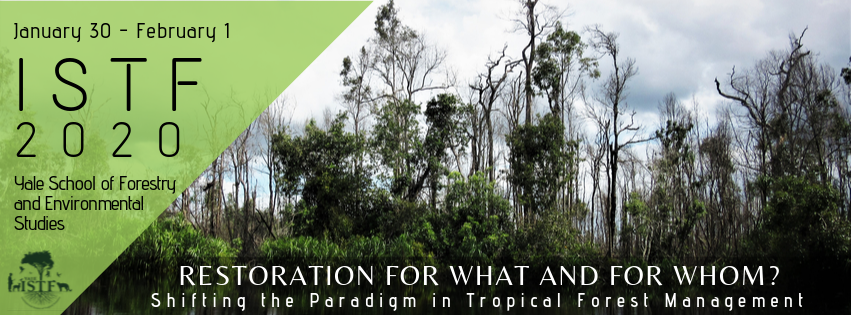
The 26th Annual ISTF Conference will take place January 30 - February 1, 2020 at the Yale School of Forestry and Environmental Studies (New Haven, CT, USA).
*Videos of all plenary sessions from the 2020 ISTF Conference can be found on our Youtube channel .
Restoration for What and for Whom?
Shifting the Paradigm in Tropical Forest Management
Please click here to register for the ISTF 2020 Conference.
The year 2020 marks the deadline for many international climate change and conservation targets, yet most goals and promises remain unfulfilled. In 2021 the UN’s Decade on Ecosystem Restoration begins, with new goals that reflect the mounting threats faced by tropical forests and their inhabitants, and the essential role of forests in combating climate change. As countries around the world ramp up their pledges to restore tropical ecosystems, we need to re-examine our approach. What is being restored? Why is restoration necessary in the first place? Who will benefit from restoration efforts and who will lose out? How should national commitments be approached, from both a theoretical and technical standpoint?
The ISTF 2020 conference calls for progressive approaches to restoration that shift the paradigm of tropical landscape management:
- projects led by and truly inclusive of those most affected by forest loss
- concrete proposals that promote ecological resilience and combat colonialism
- compelling storytelling that confronts power and impacts policy
- research that reflects on-the-ground needs
- restoration interventions that address an uncertain and novel future
It’s clear that our conventional models won’t solve the climate crisis. If we’re going to radically change course, we must interrogate the past and be truly imaginative about future possibilities. If restoration can be a tool to maintain the status quo, can it also be an opportunity to upend it? How can we center justice in our nature-based solutions? Given the changing climate, how can scientific models account for ecological migration, fluidity, and uncertainty? As we seek the potential for structural change in the Decade on Ecosystem Restoration, we also ask: What gets left out of the conversation when we talk about restoration? And can place-based, context-specific restoration be scaled-up?
The conference will bring together scientists, practitioners, activists, policy makers, artists, and journalists from around the world, paying particular attention to voices from the ground. Exploring both traditional practices and innovative recent approaches, we’re looking for equitable and effective solutions. Driven by questions of restoration for what and for whom, our interdisciplinary group will build a platform to address the question of how, as we plan for the upcoming decade and beyond.